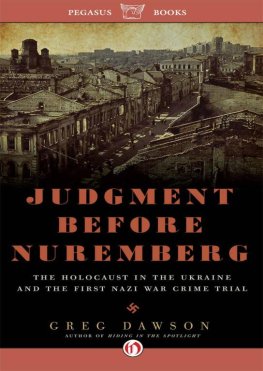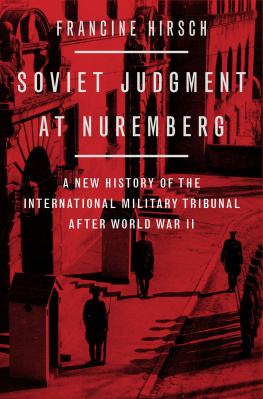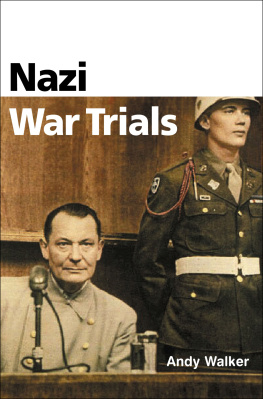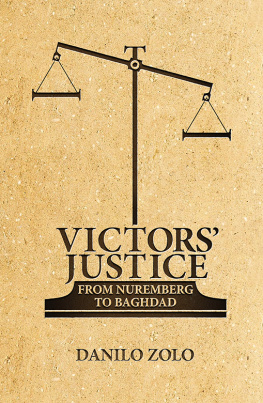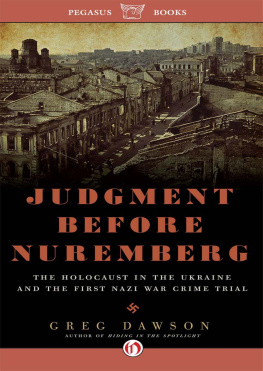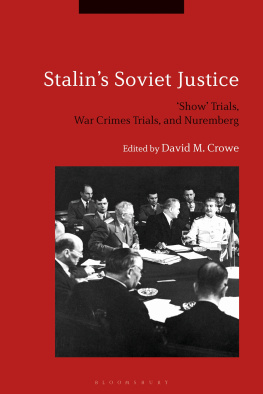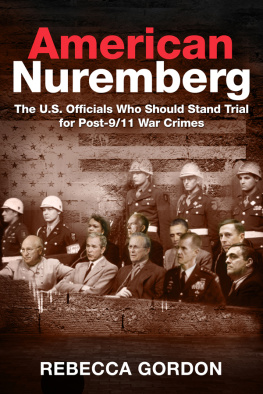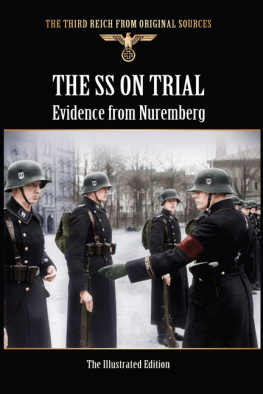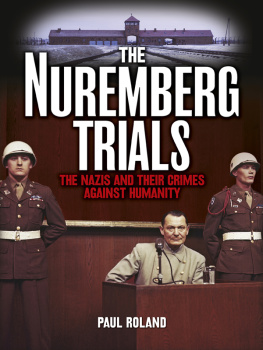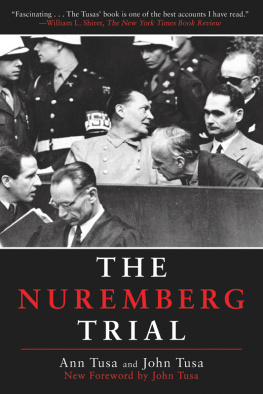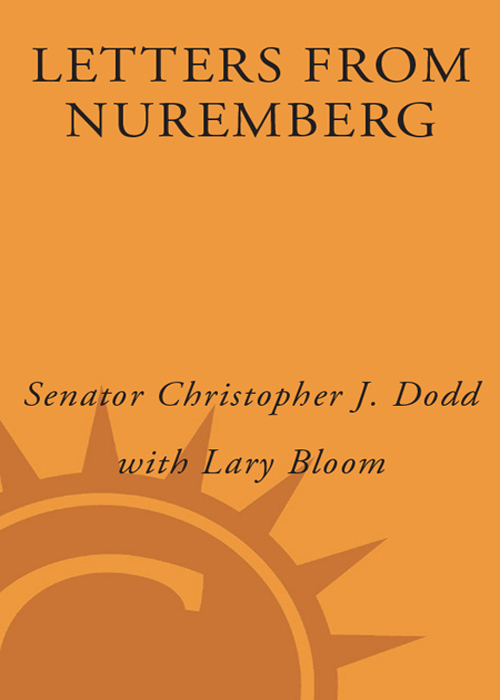
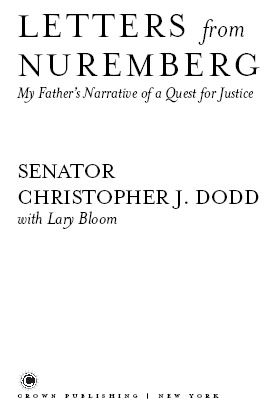
CONTENTS
To Mary Grace Murphy Dodd, the great love of my fathers life;
and Tom and Grace Dodds grandchildren and great-grandchildren,
that you find time in your lives to be a part of
something larger than yourselves
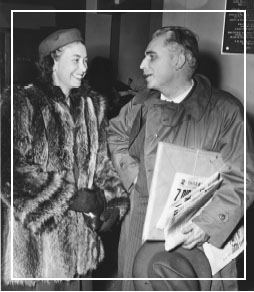
Grace Murphy Dodd and Thomas J. Dodd reunited briefly during a Christmas break in the trial.
Prologue
M Y FATHER WAS THIRTY-EIGHT YEARS OLD when he went off to confront many of the Nazis responsible for the most devastating crimes in history. He returned from the International Military Tribunal in Nuremberg fifteen months later, in October 1946, profoundly changeda transformation I didnt fully comprehend for a half a century, until well after his death.
Back in the postwar years, my parents Thomas J. and Grace Murphy Dodd and their six childrenTom Jr., Carolyn, Jeremy, Martha, Nicholas, and Ilived at 63 Concord Street in West Hartford, Connecticut. It was certainly the only house in that serene neighborhood in which relics of the Third Reich could be founda flag bearing a swastika, German helmets, and medals that Nazis awarded to mothers who bore a sufficient supply of Aryan children. It makes me uncomfortable to think of it, but back then these souvenirs were seen as reminders that America and its Allies had triumphed over a juggernaut of evil.
Our house was also, I may reasonably presume, the only one thereabouts that held evidence from the darkest period in human history in its atticevidence so ominous that the Dodd children were forbidden to see it. Worried about the impression these artifacts would leave, our parents instructed us never to venture up to the third-floor storage rooma restriction, my parents should have known, we would ignore.
In various forays, the six of us rooted through the boxes and were horrified by what we saw. There were photographs from concentration campspiles of emaciated bodies and evidence of medical experiments. We discovered old German comic books that we couldnt translate; nevertheless, we could determine their purposeto characterize Jews as less than human and to blame them for most of Germanys ills. There were pictures, too, of key moments in the trial and one that is burned in all of our memoriesmy father holding for news photographers a prosecution exhibit he had introduced: the shrunken head of a Polish prisoner.
We, of course, could not discuss these with our parents because we could not admit having seen them. This was an era before the terms genocide and Holocaust came into widespread usewell before, too, the proliferation of powerful films on the Nazi era. At that time the attention of those many citizens who cared about world affairs had been diverted toward Korea and the Soviet Union, and the proliferation of the atomic bomb.
Even so, my father always used such circumstances to bring the subject back to the lessons of Nuremberg, where he became the second-ranking U.S. prosecutor under Supreme Court Justice Robert H. Jackson. During family dinners, he sometimes recalled his days there. He described the defendants to us, and though he never soft-peddled their crimes, he avoided gruesome details. As my siblings attest, my parents wanted us to be aware of international realities but at the same time provide a safe haven at home. As a result, there were elements of the trial that remained mysterious.
As the years passed, and as my own curiosity about the world grew, there were things I wanted to ask my father about Nuremberg. Who else had a father, after all, who had known Hermann Gring, Alfred Rosenberg, Albert Speer, Joachim von Ribbentrop, and other Nazi big boys, as he called them?
When I became a student of the law, I was fascinated by the idea of Nuremberg and by its principles. There had never been a trial like it before, and its very existence proved enormously controversial.
I thought of my fathers service in a tribunal that sought not only to punish war criminals but also to demonstrate the capacity of the Allies to follow and uphold the rule of law even when a cry for vengeance was heard from all quarters; civilized countries would produce a fair trial even for mass murderers who didnt seem to deserve one. Winston Churchill was against the very ideaand favored summary execution. The Soviet Union, never known for extended efforts on behalf of its accused, had similar ideas. There were well-known American critics as well, including the chief justice of the Supreme Court, Harlan Fiske Stone, who called the idea Jacksons lynching expedition. Others argued that indictments would be ex post facto, in that the Nazis would be tried for international crimes that hadnt been explicitly on the books.
The argument that eventually prevailed was based on two powerful ideas. By trying those who carried out a criminal war, a complete record of their actions could be shown to the world, therefore announcing once and for all that such behavior would not be tolerated by the community of civilized nations. And, in giving the defendants a chance to hear the evidence against them and to defend themselves, the Allies would take the moral and legal high ground.
As Jackson said in his opening statement: That four great nations, flushed with victory and stung with injury, stay the hand of vengeance and voluntarily submit their captive enemies to the judgment of the law is one of the most significant tributes that power has ever paid to reason.
People like my father set a clear and binding standard, saying, in effect, that here precisely is what happened as a result of tyranny and that any attempt to repeat such behavior would be seen for what it is. We were nave, of course, in this view. Since Nuremberg, the world has demonstrated time and again its capacity to stun us with outrage and inhumanityCambodia, Rwanda, Bosnia, Darfur. Yet there is no doubt that Nuremberg remains more than an event of historical significanceit has become a word in the language that reminds us of ultimate collective responsibility for aggression, racism, and crimes against humanity.
All this I understood. But what was the inside story of Nuremberg? How had my father risen from a relatively low-ranking member of Jacksons enormous staff to be the man who often was in charge of the proceedings? The whole thing seemed odd and ironic to me. In a way, the Nuremberg defendants had known my father during that time in a way my siblings and I never could. Albert Speer had written, in Inside the Third Reich, that my father was sharp and aggressive. Franz von Papen, the former vice-chancellor of Germany, wrote in his Memoirs that my father was polite, correct, even kind and that after the trialhe was one of the three defendants acquittedmy father gave him a box of Havana cigars. My fathers courtroom achievements were recalled on the sixtieth anniversary of the trials by Der Spiegel, the German magazine. The star of the courtroom was Thomas Dodd[He] had the gift, in lawyers jargon, of being able to make the evidence sing. He provided the macabre high point of the trialthe shrunken head of a Pole who had been hanged. It had been found on the desk of the camp commander Karl Koch, who had used it as a paperweight.
The chances to ask about these things were rare. Much of what I knew about my fathers Nuremberg tenure came from others. Walter Cronkite, for example, told me that Baldur von Schirach, head of the Hitler Youth, tried to bring similarities into play. Von Schirach pointed out that he and the man prosecuting him had a lot in commonboth were Catholic and had led large organizations of young people. (My father served for three years as head of the Connecticut program in the National Youth Administration.) But my father would have none of it. Were nothing alike, he told von Schirach.
Next page

